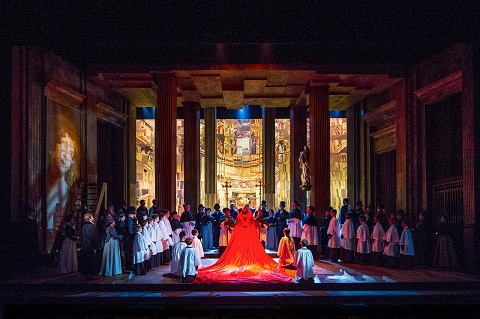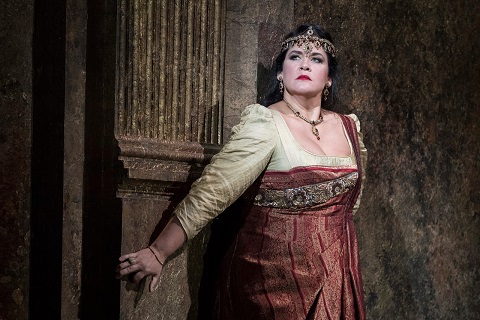Recently in Reviews
English Touring Opera are delighted to announce a season of lyric monodramas to tour nationally from October to December. The season features music for solo singer and piano by Argento, Britten, Tippett and Shostakovich with a bold and inventive approach to making opera during social distancing.
This tenth of ten Live from London concerts was in fact a recorded live performance from California. It was no less enjoyable for that, and it was also uplifting to learn that this wasn’t in fact the ‘last’ LfL event that we will be able to enjoy, courtesy of VOCES8 and their fellow vocal ensembles (more below …).
Ever since Wigmore Hall announced their superb series of autumn concerts, all streamed live and available free of charge, I’d been looking forward to this song recital by Ian Bostridge and Imogen Cooper.
The Sixteen continues its exploration of Henry Purcell’s Welcome Songs for Charles II. As with Robert King’s pioneering Purcell series begun over thirty years ago for Hyperion, Harry Christophers is recording two Welcome Songs per disc.
Although Stile Antico’s programme article for their Live from London recital introduced their selection from the many treasures of the English Renaissance in the context of the theological debates and upheavals of the Tudor and Elizabethan years, their performance was more evocative of private chamber music than of public liturgy.
In February this year, Albanian soprano Ermonela Jaho made a highly lauded debut recital at Wigmore Hall - a concert which both celebrated Opera Rara’s 50th anniversary and honoured the career of the Italian soprano Rosina Storchio (1872-1945), the star of verismo who created the title roles in Leoncavallo’s La bohème and Zazà, Mascagni’s Lodoletta and Puccini’s Madama Butterfly.
Evidently, face masks don’t stifle appreciative “Bravo!”s. And, reducing audience numbers doesn’t lower the volume of such acclamations. For, the audience at Wigmore Hall gave soprano Elizabeth Llewellyn and pianist Simon Lepper a greatly deserved warm reception and hearty response following this lunchtime recital of late-Romantic song.
Collapsology. Or, perhaps we should use the French word ‘Collapsologie’ because this is a transdisciplinary idea pretty much advocated by a series of French theorists - and apparently, mostly French theorists. It in essence focuses on the imminent collapse of modern society and all its layers - a series of escalating crises on a global scale: environmental, economic, geopolitical, governmental; the list is extensive.
For this week’s Live from London vocal recital we moved from the home of VOCES8, St Anne and St Agnes in the City of London, to Kings Place, where The Sixteen - who have been associate artists at the venue for some time - presented a programme of music and words bound together by the theme of ‘reflection’.
'Such is your divine Disposation that both you excellently understand, and royally entertaine the Exercise of Musicke.’
Amongst an avalanche of new Mahler recordings appearing at the moment (Das Lied von der Erde seems to be the most favoured, with three) this 1991 Mahler Second from the 2nd Kassel MahlerFest is one of the more interesting releases.
‘And there was war in heaven: Michael and his angels fought against the dragon; and the dragon fought and his angels, And prevailed not; neither was their place found any more in heaven … that old serpent … Satan, which deceiveth the whole world: he was cast out into the earth, and his angels were cast out with him.’
If there is one myth, it seems believed by some people today, that probably needs shattering it is that post-war recordings or performances of Wagner operas were always of exceptional quality. This 1949 Hamburg Tristan und Isolde is one of those recordings - though quite who is to blame for its many problems takes quite some unearthing.
There was never any doubt that the fifth of the twelve Met Stars Live in Concert broadcasts was going to be a palpably intense and vivid event, as well as a musically stunning and theatrically enervating experience.
‘Love’ was the theme for this Live from London performance by Apollo5. Given the complexity and diversity of that human emotion, and Apollo5’s reputation for versatility and diverse repertoire, ranging from Renaissance choral music to jazz, from contemporary classical works to popular song, it was no surprise that their programme spanned 500 years and several musical styles.
The Academy of St Martin in the Fields have titled their autumn series of eight concerts - which are taking place at 5pm and 7.30pm on two Saturdays each month at their home venue in Trafalgar Square, and being filmed for streaming the following Thursday - ‘re:connect’.
The London Symphony Orchestra opened their Autumn 2020 season with a homage to Oliver Knussen, who died at the age of 66 in July 2018. The programme traced a national musical lineage through the twentieth century, from Britten to Knussen, on to Mark-Anthony Turnage, and entwining the LSO and Rattle too.
With the Live from London digital vocal festival entering the second half of the series, the festival’s host, VOCES8, returned to their home at St Annes and St Agnes in the City of London to present a sequence of ‘Choral Dances’ - vocal music inspired by dance, embracing diverse genres from the Renaissance madrigal to swing jazz.
Just a few unison string wriggles from the opening of Mozart’s overture to Le nozze di Figaro are enough to make any opera-lover perch on the edge of their seat, in excited anticipation of the drama in music to come, so there could be no other curtain-raiser for this Gala Concert at the Royal Opera House, the latest instalment from ‘their House’ to ‘our houses’.
"Before the ending of the day, creator of all things, we pray that, with your accustomed mercy, you may watch over us."
Reviews

07 Oct 2016
English National Opera: Tosca
Poor Puccini. He is far too often treated as a ‘box-office hit’ by our ‘major’ opera houses, at least in Anglophone countries. For so consummate a musical dramatist, that is something beyond a pity. Here in London, one is far better advised to go to Holland Park for interesting, intelligent productions, although ENO’s offerings have often had something to be said for them.
Catherine Malfitano’s production once had a somewhat literalistic yet straightforward integrity to it; now it seems simply to flounder. When I saw it
previously, in 2011, the Personenregie at least proved
generally accomplished; here it veers (too little rehearsal time for a revival, perhaps?) between the non-existent and the all-too-local am-dram. The lack
of any discernible concept thus matters far more than previously it did. We simply have sets and costumes and wandering around. Quite why the Sacristan
looks as though he comes from Shoreditch-cum-Kandahar I have no idea. Nor do I understand the weirdly inter-galactic backdrop for the third act. The rest -
well, the rest is unobjectionable, yet nothing more.
The ENO Orchestra, as usual, was on excellent form. Oleg Caetani summoned up some luscious sounds, especially in the third act, although I found the first
act a little jocular in tone. There was, in general, a reasonable sense of line, although Caetani fell some way short of the more distinguished ‘symphonic’
realisations. (No, it is not really quite the right word, but we all know what it means in this context.) Greater variegation would also have been welcome;
I never felt Caetani was engaging with anything other than the score’s (impressive) surface. Choral singing was also of a high standard; let us never
forget the sterling work the chorus undertakes day in, day out.
 Keri Alkema as Tosca. Photo Credit: Richard Hubert Smith.
Keri Alkema as Tosca. Photo Credit: Richard Hubert Smith.
It was not, however, a vintage night for solo singing. Keri Alkema offered an alert performance in the title role, but it rarely caught fire until the
second act, and only intermittently then. Gwyn Hughes Jones clearly has quite a following at the Coliseum. Although he certainly has vocal heft, I was
unable to discern much beyond that in his Cavaradossi: his singing was generalised - far too often a problem in this role, I have found - and his acting at
best rudimentary. Craig Colclough’s underpowered Scarpia came across in strangely camp fashion, at least on those occasions when his voice rose above the
orchestra and/or chorus. I am all for revisionist readings, but pantomime villain faces are not a satisfactory substitute for true malevolence. The smaller
roles, however, tended to impress, Andri Björn Róbertsson’s Angelotti, Scott Davies’s Spoletta, and young Alessandro MacKinnon’s Shepherd Boy were all
especially well presented.
There was nothing bad here, then, but nor was there much over which to rejoice. Next time, might we have something that engages with the dramatic
possibilities of the work, rather than pandering to the reactionary ‘taste’ of an imaginary ‘general’ audience? The Arts Council has behaved disgracefully
towards ENO, but timidity never helped anyone, and it certainly does not help Puccini.
Mark Berry
Giacomo Puccini, Tosca
Floria Tosca: Keri Alkema; Mario Cavaradossi: Gwyn Hughes Jones; Baron Scarpia: Craig Colclough; Cesare Angelotti: Andri Björn Róbertsson; Sacristan:
Adrian Powter; Spoletta: Scott Davies; Sciarrone: Graeme Danby; Gaoler: Robert Winslade Anderson; Shepherd Boy: Alessandro MacKinnon. Director: Catherine
Malfitano; Revival director: Donna Stirrup; Set Designs: Frank Peter Schlössman; Costumes: Gideon Davey; Lighting: David Martin Jacques, Kevin Sleep.
Chorus of the English National Opera (chorus master: James Henshaw)/Orchestra of the English National Opera/Oleg Caetani (conductor).
Coliseum, London, Monday 3 October 2016.

